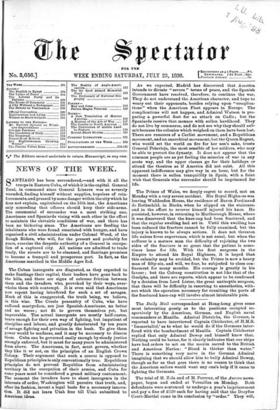The Cuban insurgents are disgusted, as they expected to make
Santiago their capital, their leaders have gone back to the hills, and there are signs of extreme friction between them and the invaders, who, provoked by their ways, over- whelm them with contempt. It is even said that Americans now repent having interfered for such a set of savages. Much of this is exaggerated, the truth being, we believe, in this wise. The Creole peasantry of Cuba, who have suffered martyrdom, are just Spanish-Americans, no better and no worse ; not fit to govern themselves yet, but improvable. The actual insurgents are mostly half-castes, brave enough for their own way of fighting, but impatient of discipline and labour, and greatly deteriorated by ten years of savage fighting and privation in the bush. To give them power would be madness, and it may be necessary to disarm them. Cuba can be governed easily enough by steady justice strongly enforced, but it must for many years be administered from above. The Americans, in fact, must govern, whether they like it or not, on the principles of an English Crown Colony. Their argument that such a course is opposed to Republican principles is only conventionally true. Republican principles du not prevent Republics from administering territory in the occupation of their armies, and Cuba for some years must be considered a grand military cantonment. The moment the invaders have to shoot insurgents in the interests of order, Washington will perceive that truth, and, after its fashion, invent a legal basis for a necessary innova- tion. It did not leave Utah free till Utah submitted to American ideas. As we expected, Madrid has discovered that America intends to dictate " severe " terms of peace, and the Spanish Government have resolved, therefore, to continue the war. They do not understand the American character, and hope to weary out their opponents, besides relying upon "complica- tions" when the American Fleet appears in Europe. The complications will not happen, and Admiral Watson is pre- paring a powerful fleet for an attack on Cadiz ; but the Spaniards receive that menace with sullen hardihood. They do not live by commerce, and do not see why they should sub- mit because the colonies which weighed on them have been lost. There are rumours of a Carlist movement, and a Republican movement, and an anarchical movement, but the Queen Regent, who would set the world on fire for her son's sake, trusts General Polavieja, the most sensible of her soldiers, who may be able to protect the dynasty. It does not appear that the common people are as yet feeling the miseries of war in any acute way, and the upper classes go for their holidays or attend the theatres as if America did not exist. All this apparent indifference may give way in an hour, but for the moment there is sullen tranquillity in Spain, with a faint wish that Generals who surrender should be imprisoned for life.


































